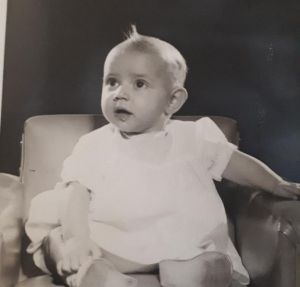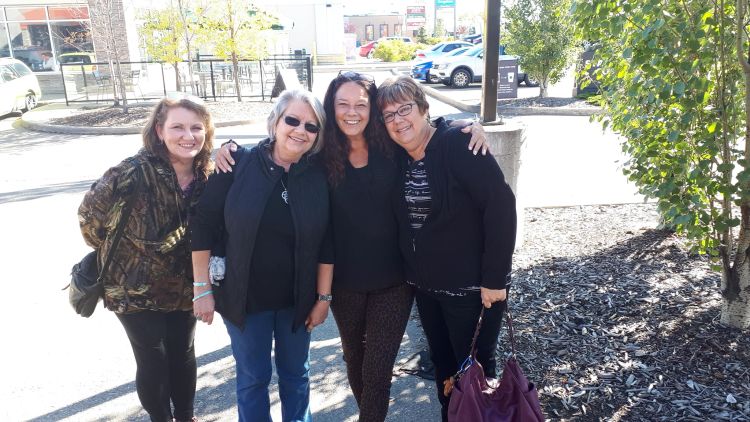

When Janice Carlson-McLeod, 63, was growing up, she never knew what it was like to have siblings.
“It sort of hasn’t sunk in with me yet. It’s something that’s so foreign to me, never having siblings that it’s hard to grasp,” the Edmonton woman said.
“To go from being an only child for 63 years to suddenly being one of 10.”
Carlson-McLeod was adopted as a baby. Earlier this year, her daughter Amanda Bounds submitted her DNA for testing, which revealed her mom had two biological sisters.
LISTEN BELOW: Carlson-McLeod talks about how she felt learning she had siblings
“It kind of got the ball rolling at that point. Then my mom did her DNA test and then they started talking,” Bounds said. “I’m saying ‘aunts’ and ‘uncles’ and it’s never been there. So for me, it’s been a huge thing.”
READ MORE: DNA testing can help with early diagnosis, but that could mean sharing the results
Through the Ancestry DNA website and by speaking to relatives, the half-sisters learned their biological mother gave birth to 10 kids. Five of the children were raised by their mother, who has since passed away.
On Sept. 19, three of the half-sisters met in person for the first time for lunch at a south Edmonton restaurant. Global News interviewed the group of women at the end of their lunch date.
“Being alone all your life. Not having siblings… It’s a good experience,” Monique Andrews, 62, said.
She was born at Edmonton’s Misericordia Community Hospital and adopted as a baby. Andrews now lives in Campbell River, B.C.

WATCH: 80-year-old man in BC uses DNA test to find relatives
“It does make you feel complete,” Heather Thew, 60, said.
She was also born at the Misericordia and adopted as a baby. She now lives in Penticton, B.C.

Get breaking National news
“I always wanted to find females. I had three boys. No girls in the scene.
“I always wanted a sister. Lucky, now I have them.”
“It would have been really nice if we had met younger because, when our children were young and stuff, we could have done things together as sisters,” Thew said.
Carlson-McLeod and Thew went to the same Edmonton high school, just a few years apart.
Brenda Weintz, 67, was also born at the Misericordia, adopted as a baby and now lives in Armstrong, B.C. She did her DNA test a couple of years ago and recently made the connection that she is part of a group of 10 half-siblings.
“I’m quite shy and I kind of kept to myself all my life and it’s kind of hard for me to actually meet new people. But my son and my daughter-in-law insisted,” Weintz said. “You get into your sixties. You’re set in your ways and used to being alone all the time.”
“Now, all of sudden, you have family and you just kind of think, ‘Wow, what do you do now?'”
READ MORE: ‘Mom feels more like a dad’: how Alberta couple explained transition to 5 kids
Tim Hoffman, Rennie Hoffman, and Pat Chorney, along with two other siblings, were born in Edmonton and raised together in Vancouver. They said their mother didn’t tell them she had other children.
Tim Hoffman, 52, who lives in Surrey, B.C. said he only learned in September that DNA testing revealed he had half-sisters.
“I just got home from work, sat down and I got a call saying, ‘You’ve got to call me ASAP.’ I go on Facebook, talking with my sister-in-law, and she says, ‘You’ve got five more sisters,’ and I’m like, ‘What?'” Hoffman said. “It’s shocking to me. Ten kids, that’s a lot.”
“I’m happy to know that I do have family out there,” Rennie Hoffman said from his home in Surrey.
“I’m a little shocked,” said Chorney from her home in Winnipeg. “Knowing that I got sisters when I was the only one of all the boys.”
At the time of publishing, Global News was not able to contact the other half-siblings.
Watch below: Imagine growing up without any brothers or sisters, then deciding to take a DNA test and the results turn up nine siblings you never knew you had. The test kit cost $100 but how reliable is DNA testing? Kim Smith reports.
_tnb_1.jpg?w=1040&quality=70&strip=all)
How accurate are DNA tests?
DNA testing kits are now more affordable and easier to use than they’ve been ever been. On its website, Ancestry DNA says it has more than 10 million people in its database and advertises its kit for $129 CDN.
Other DNA websites, such as 23andMe, advertise a Thanksgiving special for $79 CDN.
“Almost every client is taking a DNA test or is interested in taking one,” Colleen Murray, a professional genealogist in Edmonton, said.
“It’s a normal step in the genealogical process now.”
Murray said almost all of her clients have taken a DNA test or have the intention of doing so. She said new guidelines from the Board for Certification of Genealogists stipulate DNA is necessary to prove a relationship.
“Not only do we have to consult paper, but we have to use DNA,” she said. “It’s not going to go away now that these tests are so available.”
READ MORE: It’s true: Parents get sicker than their kids
Tests will show how much DNA you share with another person, which is measured in centiMorgan. Generally, the more DNA you share with a person, the higher the number will be. For example, a half-sibling will share on average 1,800 centiMorgan.
“The DNA is extremely reliable, especially for close matches,” Murray said.
“If you’re matching someone — fifth or sixth cousin — it’s possible they’re not a match to you, but you’re matching with them by coincidence. But if you have a close match — fourth cousin or less — I would estimate you’re definitely related. You might not know how, but you’re definitely related.”
Murray said before doing a DNA test, families have to be prepared to discover secrets.
READ MORE: Did your genetic test flag that you’re at risk of a terrible disease? Don’t panic, experts say
“Are they willing to discover something in the closet that they maybe didn’t know about? A skeleton in the closet or a family member that they maybe didn’t know about?”
“You can’t really hide from DNA. There’s an expression in the DNA world that DNA doesn’t lie.”
She also cautions that the process can be overwhelming. The test itself is easy, but the results can sometimes be difficult to interpret.
“You can literally get thousands of matches and it can be frustrating when you can’t figure out how they’re related.”
The half-siblings all said they are hoping to meet some time in the future.
Need help understanding DNA?
The Alberta Genealogical Society (AGS) runs a special interest group (SIG) which focuses on DNA. It attracts about 40 to 60 people to its meetings.
“We get new people pretty regularly,” Ellen Thompson-Jennings said.
She runs the DNA special interest group and has a website called Family History Hound.
READ MORE: What you should know about genetic testing kits
The meetings are held every second month on the third Wednesday. The next meeting will be October 17 at the Edmonton Library on 118 Avenue.
Want more ways to keep up to date? Check out the “Family Matters” podcast! If you haven’t subscribed yet — what are you waiting for?
Subscribing’s easy! Here’s how…

- Open the Apple Podcasts app, search for “Family Matters” and select it from the list of results.
- Once on the Family Matters page, click the “Subscribe” button to have new episodes sent to your mobile device for free.
- Click the name of an episode from the list below to listen.

- Open the Google Podcasts app, search for “Family Matters” and select it from the list of results.
- Once on the Family Matters page, click the “Subscribe” button to have new episodes sent to your mobile device for free.
- Click the name of an episode from the list below to listen.



Comments
Want to discuss? Please read our Commenting Policy first.